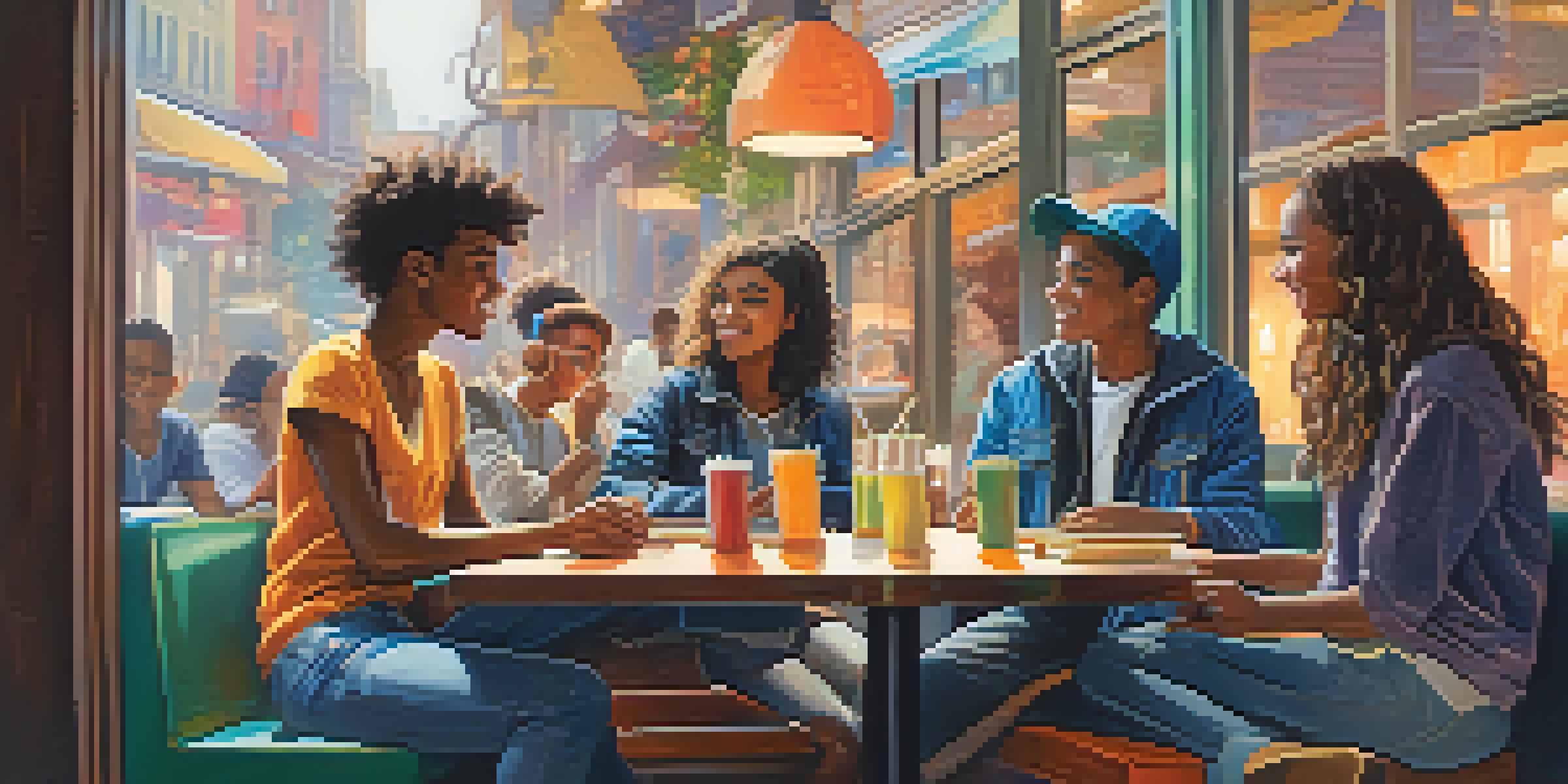Hollywood's Role in Shaping Teen Identity and Self-Expression

The Power of Film and Television in Teen Culture
Hollywood has a profound influence on teen culture, often serving as a mirror that reflects societal norms and values. Young audiences connect with characters and stories that resonate with their own experiences, creating a sense of belonging. Through films and series, teens can see their struggles, dreams, and identities represented, which can validate their feelings and choices.
Movies are a portal to the world, a lens through which we can see ourselves and others more clearly.
For example, shows like 'Euphoria' tackle complex themes such as mental health, sexuality, and substance use, sparking conversations among teens. These narratives allow them to explore their identities and self-expression in a safe space. The emotional connection they form with these characters often leads to increased empathy and understanding of their own lives.
Moreover, these portrayals can also shape aspirations and self-image. When teens see characters overcoming challenges or embracing their uniqueness, it inspires them to do the same, fostering resilience and individuality in their journey toward self-discovery.
Representation: A Double-Edged Sword
Representation in Hollywood is crucial, yet it can be a double-edged sword. While diverse narratives can empower underrepresented groups, a lack of authenticity can perpetuate stereotypes. For instance, when a character's identity is reduced to a single trait, it risks marginalizing the complexities of real-life experiences.

When films and shows include a variety of voices and stories, they can inspire teens from different backgrounds. This representation allows individuals to see themselves as part of the broader narrative, encouraging self-acceptance and pride. Conversely, when characters are one-dimensional or stereotypical, it can reinforce negative perceptions and limit personal growth.
Hollywood Shapes Teen Identity
Films and television provide teens with relatable narratives that validate their experiences and foster a sense of belonging.
Thus, it's essential for filmmakers and creators to approach representation thoughtfully. By crafting multi-faceted characters and narratives, they can contribute positively to teen identity formation and promote a more inclusive sense of self.
Social Media: The New Hollywood Stage
In today's digital age, social media has become an extension of Hollywood, allowing teens to curate their identities online. Platforms like Instagram, TikTok, and YouTube enable users to express themselves creatively, often mimicking the trends seen in popular films and shows. This convergence of media has shifted the way teens engage with their identities.
Music can change the world because it can change people.
Social media provides a platform for experimentation, where teens can explore their interests, styles, and personalities. By sharing their experiences and connecting with others, they build communities that celebrate self-expression. However, this can also lead to the pressure to conform to the curated identities often showcased online.
Balancing authenticity with the desire for validation can be challenging. As teens navigate their digital personas, it's essential for them to understand the difference between real life and the edited versions they see on screens, fostering a healthier relationship with their self-image.
The Impact of Celebrity Culture on Teen Aspirations
Celebrity culture plays a significant role in shaping teen aspirations and self-perception. Teens often look up to Hollywood stars as role models, adopting their fashion, attitudes, and lifestyles. This admiration can inspire teens to pursue their passions or explore new interests, but it can also lead to unrealistic expectations.
For instance, when celebrities openly share their struggles with mental health or body image, it can foster a sense of connection and understanding. This transparency can empower teens to embrace their own challenges and seek support. However, the constant comparison to seemingly perfect lives can also create feelings of inadequacy.
Representation Matters
Authentic representation in media encourages self-acceptance and pride among teens, while stereotypes can hinder personal growth.
Ultimately, it's important for teens to recognize the curated nature of celebrity lives. By focusing on their unique qualities and aspirations, they can cultivate a healthier self-image, independent of external pressures.
Fashion Trends: Influencing Teen Identity and Expression
Fashion in Hollywood has always influenced teen identity and self-expression, often setting trends that resonate with young audiences. From the iconic styles of 'Clueless' to the edgy looks seen in 'Riverdale,' these portrayals can impact how teens choose to express themselves through clothing. Fashion serves as a powerful medium for teens to communicate their personalities and values.
Moreover, many teens adopt trends seen on their favorite celebrities, using fashion as a form of self-exploration. This can lead to a sense of empowerment, as they experiment with different styles to find what resonates with their identity. However, it can also create pressure to conform to trends, sometimes overshadowing personal expression.
Encouraging teens to embrace their unique style while drawing inspiration from Hollywood can foster a healthier relationship with fashion. This balance allows them to appreciate trends without losing sight of their individuality, ultimately enhancing their self-expression.
The Role of Music in Shaping Teen Identity
Music, much like film and fashion, plays a significant role in shaping teen identity and self-expression. Soundtracks from popular movies and shows often resonate deeply with young audiences, influencing their emotional landscapes. Through lyrics and melodies, teens can find solace in songs that articulate their feelings and experiences.
For instance, the rise of artists like Billie Eilish has given voice to themes of anxiety and self-doubt, resonating with many teens navigating similar struggles. This connection can create a sense of community, as they bond over shared experiences and emotions expressed through music. It also empowers them to embrace their vulnerabilities as part of their identity.
Social Media as a New Influencer
Social media enables teens to explore their identities, but it also creates pressure to conform to curated online personas.
Moreover, music can serve as a form of rebellion or self-assertion for teens. By aligning themselves with certain genres or artists, they can express their individuality and challenge societal norms, contributing to their journey of self-discovery.
Navigating the Influence of Hollywood in a Healthy Way
While Hollywood plays a significant role in shaping teen identity, navigating its influence requires a thoughtful approach. Encouraging open discussions about the media they consume can help teens critically analyze the messages they receive. This awareness fosters a sense of agency, empowering them to make informed choices about their influences.
Parents and educators can guide teens by promoting media literacy, helping them discern between reality and fiction. By discussing the impact of representation, fashion, and celebrity culture, they can foster a healthy relationship with the media. This support can enable teens to appreciate Hollywood while maintaining their sense of self.

Ultimately, embracing the positive aspects of Hollywood while being mindful of its pitfalls can lead to a more balanced identity formation. By cultivating self-expression grounded in authenticity, teens can thrive in their journey toward self-discovery.